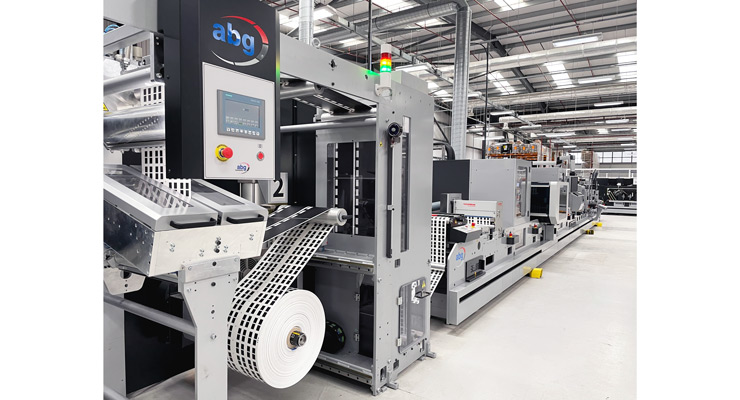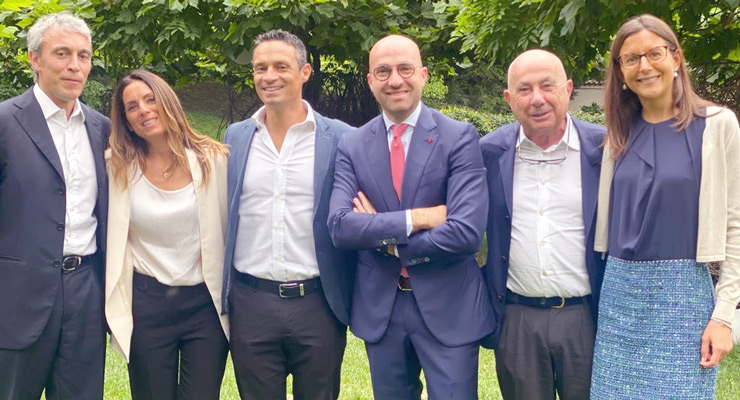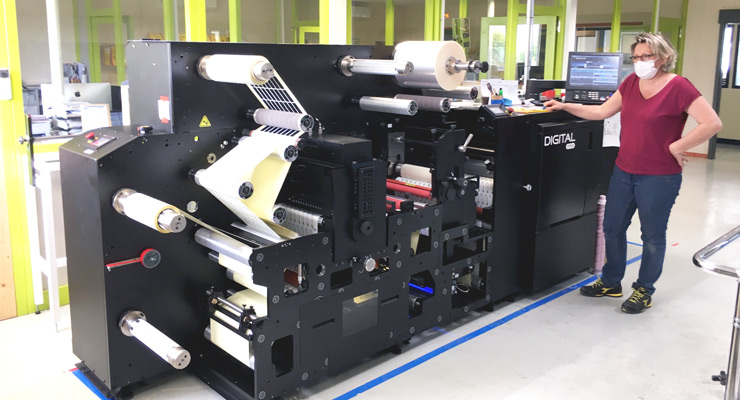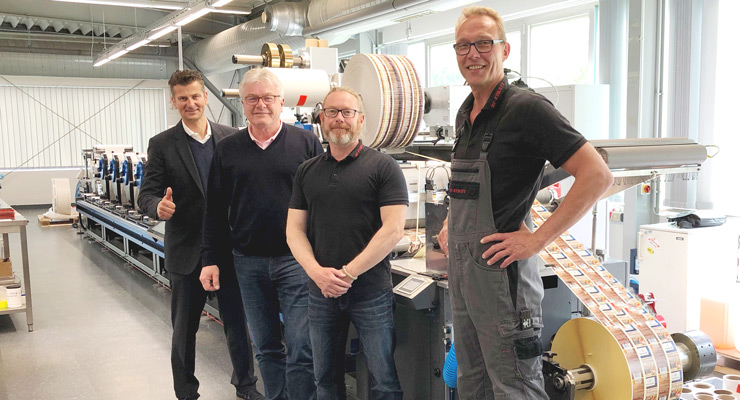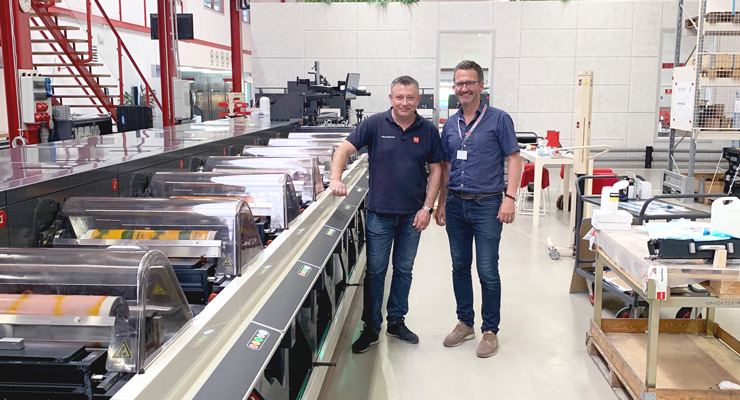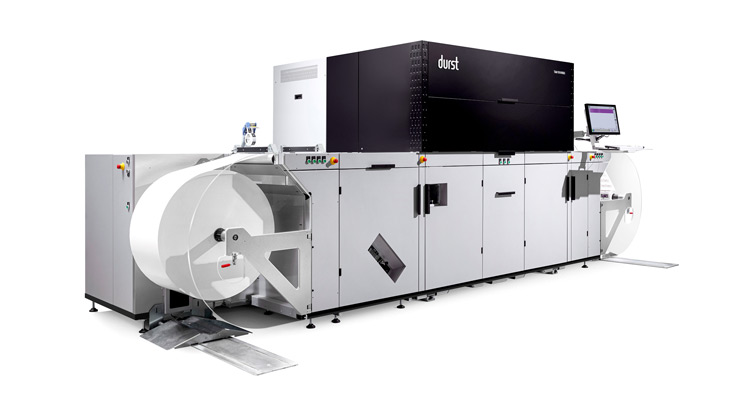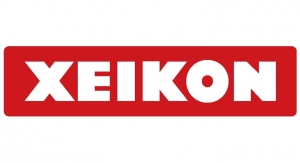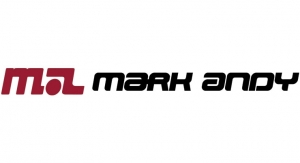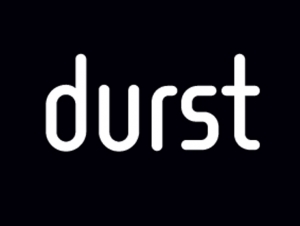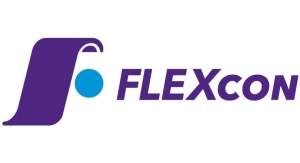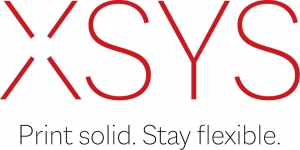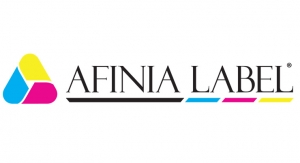Steve Katz, Associate Editor09.10.21
It’s been a tumultuous time for just about every industry. The pandemic has been a boon for some and a business-crippling curse for others. In Europe, just like other geographic regions within the label converting sector, the same applies – the specific end-use sectors a converter primarily serves will determine how well they’ve fared during the Covid-19 pandemic.
Data coming out of Europe shows how the label industry experienced a spike amid the pandemic. European labelstock demand grew by 6.8% in the first quarter of 2020 compared to the same quarter the previous year. The increase followed modest growth rates of 1.8% and 1.4%, recorded in 2019 and 2018, respectively, although the second half of 2019 already indicated an upward trend with above 3% year-on-year increases. Results have been strongly impacted by Covid-19 and the subsequent lockdowns, as short term demand for critical supplies to the food, pharmaceutical, personal care and medical markets surged, and retail chains started stockpiling in anticipation of prolonged lockdown periods and consumer hoarding.
In view of these numbers, it should be no surprise that lead times for self-adhesive materials, especially for non-critical goods, have increased substantially. Apart from the availability of raw materials (not only self-adhesive materials but also critical chemicals for the manufacture of consumables such as inks, adhesives and silicones), label converters have faced the impact of lockdowns, which have included the reduced availability of staff on the shop floor, adjustments necessary to comply with tightened operational safety and health measures, and cashflow issues related to unilateral extension of payment terms by customers.
In good times and bad, when looking into the health of a specific market – such as the European label market – the best clues that shed light on growth and success can be found by looking at who is active and spending, whether it’s on new pieces of capital equipment, M&A activity, or personnel additions.
Let’s take a look across the continent at what’s been happening.
UK: Hybrid converting of postage stamps, MacDermid expands
International Security Printers (ISP) has invested in advanced hybrid print, finishing and inspection systems for barcoding postage stamps. The fully inline systems incorporate equipment from selected specialists, including A B Graphic International (ABG), Domino and Lake Image Systems.
As a security printer, ISP produces high-caliber print for a large global client base from its UK and France production sites. Its work and expertise, which is at the forefront of print, ink and materials technology, enables the business to create innovative, secure solutions for industries with high monetary or intellectual value products and services. From security printing to advanced track-and-trace and authentication capabilities, as well as custom consultancy services, ISP’s solutions help companies combat fraud to better protect their brands and revenues.
ISP’s investment will enable postal authorities worldwide to add unique barcodes to stamps and, by doing so, be able to offer their customers more convenient, new services in the future, such as track-and-trace, to provide protection against counterfeiting and reuse. The barcodes, which can match stamp color, sit alongside the main body of the stamp, separated by a simulated perforation line.
“For postal stamp applications, this is the first time that various key industry parties have joined together to provide hybrid print and finishing solutions,” says Matt Burton, ABG’s global sales director. “All manufacturers have been fully onboard throughout the project, wanting to see a successful conclusion. Clearly, we are all delighted that both systems are now fit for purpose, and we look forward to seeing ISP rolling out the initiative.”
ISP’s hybrid digital print, finishing and inspection systems are based on two types of machine configurations – one producing sheets of stamps and the other booklets. For sheets, the inline system consists of ABG’s non-stop unwinder (NSU) to automate by splicing together two rolls of material on the fly and ensuring a non-stop feed of material into the engine room of the system, an ABG Omega Converter 430. The modular and multi-functional converter houses a 4-color Domino N617i UV inkjet digital print module that prints the stamps and barcodes, printing inline and in color. A Lake Image inspection system is also integrated, and this is surrounded by ABG’s diecut and sheeter modules to cut the web down into final sheets. Any sheets with defects are instantly recognized and diverted into a waste compartment for non-compliance, while good sheets continue and are fed neatly on to a two-meter long shingle conveyor.
The hybrid system for booklets of postage stamps is on the same lines as the sheet configuration, except for the inclusion of a Domino K600i printer to print barcodes in monochrome, as well as the color barcodes printed by the N617i. A barcode is also printed on the outside of the booklet to identify the stamp barcodes inside. A second ABG diecut module is configured as part of this solution for enhanced functionality from this hybrid platform, as well.
Ian Brigham, ISP’s managing director, says, “We are proud to be part of a monumental change in the history and fortunes of the postage stamp. The coming together of experienced print and finishing specialists to create these systems has been both unique and impressive. Our thanks to them for a job well done.”
Also in the UK, MacDermid Graphics Solutions has announced the groundbreaking of a new photopolymer plate production line at its manufacturing facility in Wigan. The new line will double MacDermid’s current production capacity and will be the primary supply source for customers throughout Europe, Africa, the Middle East, Asia and Australia.
The new 100-foot, fully enclosed photopolymer plate production line will be a parallel operation to the company’s current production line in Morristown, TN, USA. The line will feature technology all integrated within a single control system. Additionally, energy-efficient features within the line will help to reduce MacDermid’s per unit greenhouse gas emissions.
“When I joined MacDermid Graphics Solutions in April 2020, we started the transformation to become the most customer-centric, innovative company in the package printing industry. This new production line is a step forward in our transformation by answering the increased demand for our products and demonstrating our continued commitment to the industry,” says Brad Wills, global senior vice president of MacDermid Graphics Solutions.
The new production line in Wigan is expected to come online in the second half of 2022.
Italy: All4Labels’ acquisition, new Omet installation and service app
All4Labels Global Packaging Group, a multi-national label company with 29 production sites and more than 3,000 employees, is continuing its growth trajectory. The Group recently came to an agreement with the Olivieri family, thus making Italian PS label converter Etichettificio Dany part of All4Labels.
While Etichettificio Dany becomes a fully-owned subsidiary of All4Labels, Marco Olivieri, who founded and developed the business over decades, becomes shareholder of All4Labels and part of the management team. Etichettificio Dany realized a total turnover of approximately €13m in 2020 with a facility in Riccione, serving premium SME local customers with labels for the food and beverage and home and personal care markets.
Adrian Tippenhauer, CEO of All4Labels Group, says, “This new union with Etichettificio Dany marks an important milestone for All4Labels and especially our capabilities in Italy. We are pleased to welcome Mr. Olivieri and the Olivieri family, as well as all the employees as new members of the All4Labels Global Packaging Group. We are looking forward to continuing the success story of All4Labels together in the future. I would as well like to thank Guido Iannone and the Italian Triton team, especially Fabrizio Gualdi and Eleonora Astori, for the great support in this transaction. Without their dedication, it would not have been possible to bring this to a success.”
Marco Olivieri comments, “Becoming part of the All4Labels family provides us with the opportunity to contribute our know-how and capabilities to a global lighthouse in the packaging industry. This will allow Etichettificio Dany to even further improve and grow, drawing on synergies offered through this partnership.”
Be Packaging, a label converter based in Benevento (Southern Italy) has installed a new Omet XFlex X7 press. The company has been an Omet partner since 2009 and aims at expanding its market share by focusing on high print quality, speed and reliability. This led to the investment in the new press, which is a part of the strategy that has paved the way for Be Packaging’s success, which didn’t stop for the pandemic.
“The partnership with Omet was born well before Be Packaging’s foundation,” explains Giacomo Romano, CEO of Be Packaging. “The first Omet Flexy 330 was bought in 2009. Since then, we have started organizational and technological production developments that led us to the Omet X7. This cutting-edge piece of equipment allows us to offer our customers very high-quality products with an improvement in service and speed. We are also aiming at new markets in the mid-run sector, where we were not competitive before.”
Be Packaging is currently focused on label printing for the Italian market, but the new press will help expand its reach – the company is building a foreign sales network, working with clients from a wide range of countries throughout Europe and beyond. Its products include self-adhesive labels, warranty seals, resealable multi-layer labels, IML labels, wet-glue labels, shrink sleeves and aluminum caps. Be Packaging has invested in equipment to complement its flexographic printing, including hot foil, cold foil, UV varnishing, lamination, screen printing, embossing, debossing and digital offset.
“We installed the X7 in January and completed the training and testing steps in March,” says Romano. “During those two months we started sleeve production, and the results were very satisfactory. The market is constantly evolving and has changed a lot as a result of the pandemic. At this stage, we are observing the trends and trying to prevent negative effects. With the Omet X7, we enter markets such as food and beverage and pharma, areas we’ve been aiming for. Once the capacity saturates, we will be able to evaluate new investments. Today, we have different technologies in production.”
In other Omet news, the company has announced the launch of Nova App, a new virtual access service in multiple languages designed to transform service and installation processes. It was developed with foresight just before the pandemic and tested with excellent results during the lockdown, the company says. The app is capable of translation in 64 languages, both voice and chat, allowing Omet’s service and support staff to proceed effectively and promptly.
According to Marco Calcagni, Omet sales director, and Antonio Muraca, technical assistance manager, Nova represents a new frontier for customer assistance. It is managed directly from Omet’s offices, allowing the company’s technicians to work in customers’ virtual reality and to guide the local staff over needed operations with precision.
“What distinguishes this app from the others is the instant translation and the ease of customer interaction. Thanks to Nova, over the recent months we have been able to solve customers’ requests in all continents without the physical presence of our technicians. We managed to carry out maintenance and complete replacement of machine parts, virtually guiding the staff on site,” explains Muraca. “We already had the opportunity to successfully test the app during the lockdown, and we think Nova will be the protagonist in the future also for remote installations carried out by local collaborators.”
Calcagni comments, “The Nova App is already active globally and represents a revolution for the world of assistance. With the pandemic, it becomes the key to manage any type of remote technical intervention, from installation to fault repair, without any delay or loss of effectiveness. However, Omet does not consider it a simple goal, but the first step towards an even more ambitious goal: 24-hour assistance.”
France: Ballouhey again goes digital with Mark Andy
Ballouhey SAS is a fifth-generation, family-owned printing company located in Saint Marcellin, in the Auvergne Rhone-Alpes region of Southeast France. Traditionally a sheet-fed offset house with some digital capacity, Ballouhey invested in a Mark Andy Digital One press in 2018 and most recently has added its successor, the Mark Andy Digital Pro, to its production portfolio.
In 2018, following the addition of the Digital One, Ballouhey took a closer look at what web-fed digital could offer. Managing director Fabien Ballouhey explains, “The volume of work we were sub-contracting to digital printers was growing fast, and we felt the time had come to bring it back in-house. The Mark Andy Digital One appealed to us because it was simple to operate and allowed us to print and finish in one pass.”
Digital One, like the new Digital Pro, needs no clean-room environment and is a servo-driven, dry toner-based press designed to offer high-quality print at a low level of investment. Even with its small footprint, it still offers a 330 mm web width and can handle a variety of substrates without the need to use the full web width. It prints CMYK at 1200 dpi at speeds up to 19 m/m, while its flexo station can add spot color, varnishing, laminating or cold foil before diecutting and slitting. It is also fitted with an air-cooled LED UV lamp and requires only a single-phase power supply.
For Ballouhey, Digital One solved the problem short term, but as demand grew and volumes increased it became clear that extra capacity was needed. In April 2021, the company installed the latest Mark Andy Digital Pro line. The new machine builds on the performance capability of its predecessor, increasing running speed to 23.4 m/m across a range of substrates, from self-adhesive stock to films. Usefully, Digital Pro is scalable, allowing Ballouhey to update its specification to meet new demands. For example, the hybrid print station can be located before or after the digital engine, and in Ballouhey’s case, the diecutting unit is semi-rotary as opposed to fully rotary.
“The semi-rotary die station is much easier to use, gives better register, and has reduced make-ready times. We are already seeing a 30% savings and are aiming for 50%, which makes a significant difference on short-run jobs, especially combined with the faster production speed. Overall, we think the Digital Pro will be twice as productive as Digital One,” he adds.
Currently most of the company’s output is for French customers, but Ballouhey is looking to grow its export business to markets in Italy, Switzerland, Germany and the UK – but it intends to keep to its specialty of food packaging. “We have FSSC 22000, IFS and BRC accreditation for food compliance, and are very proud of our Imprim Vert certification that we achieved back in 2005. This is a commitment to environmental protection based on recycling, pollution prevention, and energy reduction,” he says.
Albania: Albdesign invests in MPS
Albdesign, a printer in Albania, has purchased its first MPS EFS 430 automated 6-color flexo printing press. Leading the sale were Sebastiaan Rakhorst, MPS regional sales director, together with Sasa Papic from Flexypack Doo Subotica, the MPS local representative in Albania.
“As the availability of local printers that provide high-quality labels is limited, Albdesign is looking to tap into this market by expanding their capabilities in label printing and flexible packaging,” says Papic. “With reliable support from MPS and their advanced press capabilities, we could offer our customer the best solution with the EFS 430 press. It is not just a machine sale – we are helping Albdesign increase competitive strength and further expand their business growth in label and flexible package printing.”
Elvis Sula, CEO of Albdesign, says, “In Albania, imported labels and flexible packaging exceed the local production by six to 10 times. Therefore, it is important for us to offer high quality, locally-printed products to our customers. After comparing various flexo printing presses, we chose MPS because of their strong reputation here as a high-performance supplier. We believe this additional press will strengthen our market position as a higher-quality label and packaging printer.”
The EFS 430 is a highly automated, multi-substrate flexo press designed for label production and flexible packaging printing on various substrates. The EFS enables operators to maximize press performance thanks to its ease of operation and reliability.
“MPS continues to invest in technologies that deliver high-quality print,” says Rakhorst. “One example is the MPS patented Crisp.Dot technology that provides minimal dot gain and a friction-free printing process. As a result, the highest consistent print quality is assured, which enables printing the most demanding quality labels and flexible packaging.”
Denmark: Nilpeter helps in fire recovery, first FA-26 installed
The Danish dairy lidding manufacturer Primoreels is no stranger to Nilpeter, having acquired a 9-color FA-17 in 2018. That press was, however, damaged in a devastating fire in September 2020, a fire that affected much of Primoreels’ production and significantly reduced the company’s manufacturing capacity.
Through hard work and determination, not to mention the help of close partners and suppliers, Primoreels is now back in full force and has invested in a new FA-17. During the restart, Primoreels purchased a refurbished Nilpeter FA-2500 to run production as quickly as possible after the fire.
“When your entire factory with production equipment, inventory and development projects burns to the ground, it feels as if the rug is pulled out from under you,” Henrik Sahlberg, Primoreels CEO, says. “Our contingency plan was, however, launched with full force on the day of the fire, so uncovering usable converting and printing machines in the market was initiated, spare stocks of raw materials were dispensed, and several different printing partners were immediately activated with preparation of clichés and converting tools,” he continues.
“The contingency plan was followed to the letter, which meant that all of Primoreels’ customers were kept running, and not a single one experienced a production stoppage due to the fire. That is a remarkable effort and something we can be proud of,” Sahlberg adds.
“Obviously, the fire was very, very unfortunate, but we are pleased that we were able to help Primoreels in a time of need, alongside our industry partners, and make sure they could sustain production during the rebuild. We’re very happy to continue the partnership and expect great things now that Primoreels is 100% re-established,” says Jesper Jørgensen, global sales manager, Nilpeter.
Built around the modern print operator, with an intuitive user-interface and fully mobile print controls, Nilpeter says the FA-17 provides a maximum level of stability, the tightest register tolerance, and excellent printing results on multiple substrates – all normal self-adhesive materials, including flexible packaging films, polymer films, metallic films and paper.
The FA-17 features Nilpeter’s lightweight, easy-load sleeves for reduced setup times, easy handling, increased production speeds, higher printing quality and impressive durability, not to mention a lower cost per label.
Label converter FlexoPrint, located in Randers, a part of Optimum Group, recently became the first Danish printer to install the new Nilpeter FA-26. FlexoPrint chose the FA-26 after months of comprehensive research, production job tests and calculations.
“We identified a lot of customer products that could be run better and more efficiently on the FA-26,” Lars Ole Nauta, CEO of FlexoPrint, says, adding, “In addition to that, we see a gap in the market between the big foil printers and the narrow web business. The foil printers usually have very long lead times, while we in the label business are used to very, very short lead times. So, if we can combine our label world into the foil world, perhaps there’s a market there. That was one of the reasons why we decided to make this investment and take this chance on investing in the Nilpeter FA-26.”
“We have followed the development of the FA-26 over the last few years, and it’s just like we want it – it’s very lean; it’s very simple,” adds Nauta. “Efficiency in pricing and competitiveness is very important for FlexoPrint, and also for the Optimum Group, when we purchase machines. It’s not something we take lightly. Actually, I’ve always said buying hardware is one of the most difficult jobs as a CEO. It will follow you for many years. So, we did a thorough investigation, with months and months of calculating and thinking about which way to go. At the end of the day, we thought that the FA-26 was the right choice for us.”
The FA-26 is the latest and widest flexo press Nilpeter has ever developed. Designed for value-added short-run flexible packaging and labels, all inline, and fully sleeve-based, both for anilox and plate rollers. The FA-26 robust unit construction, compact footprint and landscape design ensure optimum register and consistent high printing quality at all speeds. Designed to print with water-based and solvent inks, with UV, LED, and E-beam processes – in any combination – the FA-26 is touted as a “game-changer” in short and long run flexible packaging printing, from pouches and sachets, to wrap-arounds, shrink sleeves, labels and more.
Germany: Durst’s beta testing success, Growth with Gallus, Labelwerk goes digital with Xeikon
Italian digital press manufacturer Durst announced the successful beta testing of its new Tau 510 RSCi at All4Labels’ facility in Gebesee, Germany. All4Labels, which has 29 production sites across the world and more than 3,000 employees, specializes in the home and personal care markets, as well as food and beverage. The Tau 510 RSCi was installed at the All4Labels plant in Gebesee in mid-2020 and was since tested under real production conditions for a dedicated range of label and package printing applications. Thanks to the positive performance of the beta machine, another machine has meanwhile been installed in the same press room to further increase production capacity needs in Gebesee, followed by multiple installations in other All4Labels’ plants across Europe.
Christian Kraft, plant manager at All4Labels Gebesee, says, “This investment in Durst’s RSCi printing technology, software and service represents a further step up in what we offer for customers demanding the very best, who include internationally renowned brands and local companies. Optimization of production processes has become All4Labels’ main priority in a market where we see a high level of customization, premiumization and personalization. Digital printing and the associated technologies have allowed us to offer greater flexibility and faster response to the marketplace. Now, with the new Tau 510 RSCi, Durst has moved to yet another level and will be providing us with industrial performance for medium and long print runs with outstanding quality.”
German label converter HP-Etikett recently completed a double investment in Gallus, adding two new Gallus Labelmaster presses with UV LED curing from GEW. For this investment, the family-run company is relying on UV LED technology, as well as the flexibility of the modular machine system.
The production lines were delivered and installed within a few weeks in February and March 2021 and are mainly used for the production of highly-embellished labels. The first of the two Gallus Labelmasters is an 8-color flexographic press, equipped with a cold foil embossing unit, the possibility of lamination and an MR Touch rewinder, and offers ideal conditions for the production of high-end labels. The second Gallus Labelmaster includes five flexo printing units, as well as the option of back printing on glue (delam-relam). Due to the web shifting device, HP-Etikett is able to print and diecut multi-layer labels with the 5-color Labelmaster. With a printing width of 440 mm, both lines are equipped with a UV LED ink curing system from GEW, a rotary diecutting unit and the rewinder MR Touch Quick.
“I am still enthusiastic about the flexibility of the Gallus Labelmaster, even after several months of use,” states Eugen Kölling from HP-Etikett GmbH & Co. KG. “The handling of the machine system is intuitive, i.e. the presses are easy to use by our operators, easily accessible with a quick setup. In autumn 2020, we made the deliberate decision to invest in UV LED technology. This enables us to further reduce our CO2 emissions and make production more efficient in the long term. The Gallus Labelmaster can be used flexibly, but also the details are convincing. For example, we can change ink chambers within a very short time: the operator prepares and cleans the ink chamber outside of the machine; the change is quick and clean within a few minutes.”
German label printer Labelwerk GmbH has taken its first step into digital color label printing with a Xeikon 3030 REX. The machine was installed at the beginning of April and is the first of its type in Germany. The Xeikon REX portfolio comprises a range of remanufactured Xeikon presses, providing an attractive and affordable option for printers looking to expand their businesses with the addition of digital.
Labelwerk GmbH is an owner-managed business currently employing 18 staff. Its focus is on self-adhesive labels for the pharmaceutical industry, including a number of generic brands. The customer portfolio also includes companies from the automotive industry and manufacturing businesses from all over Germany, as well as in other European countries. Prior to acquiring its Xeikon 3030 REX digital print, Labelwerk’s production portfolio consisted of five offset presses primarily used for book printing and two heatset web presses, as well as a somewhat outdated monochrome laser printing press for barcodes, which was sufficient to meet customer demand at the time.
However, times have changed, as managing director Jens Hermann explains, “For many years, the main focus of technical pharmaceutical labels was on the accurate reproduction of medical information. These labels have now become ‘colorful,’ meaning that they involve color effects and graphical content. At the same time, there is now increasing demand for shorter runs with frequently changing images and different language versions. Labelwerk responded to this by making the decision to purchase a Xeikon 3030 REX following extensive market research.
“To be honest, we resisted going down the digital color route for a long time because of concerns about cost and quality issues. However, digital printing technologies in general have made tremendous progress. In particular, Xeikon’s proposal for us to purchase a remanufactured press for a fraction of the cost of a new one tipped the balance for us. Compared to other digital printing press providers, Xeikon offered the best overall package,” Hermann adds.
Label orders of up to about 400 square meters can be produced more profitably on the new Xeikon 3030 REX than on a book-printing offset press, as the costs associated with traditional prepress, such as plates and make-ready, are not incurred – the order is simply sent to the press at the touch of a button. Another benefit, according to Hermann, is the sharpness and definition of fine black text on transparent film.
“For a business on this scale, getting into digital printing can be an enormous financial effort. Xeikon introduced the REX portfolio of remanufactured presses in order to enable small and medium-sized printing businesses like us to get into the profitable and growing digital printing market without the major investment previously required,” says Jürgen Zeußel, sales manager, Label & Packaging Germany at Flint Group Digital.
Data coming out of Europe shows how the label industry experienced a spike amid the pandemic. European labelstock demand grew by 6.8% in the first quarter of 2020 compared to the same quarter the previous year. The increase followed modest growth rates of 1.8% and 1.4%, recorded in 2019 and 2018, respectively, although the second half of 2019 already indicated an upward trend with above 3% year-on-year increases. Results have been strongly impacted by Covid-19 and the subsequent lockdowns, as short term demand for critical supplies to the food, pharmaceutical, personal care and medical markets surged, and retail chains started stockpiling in anticipation of prolonged lockdown periods and consumer hoarding.
In view of these numbers, it should be no surprise that lead times for self-adhesive materials, especially for non-critical goods, have increased substantially. Apart from the availability of raw materials (not only self-adhesive materials but also critical chemicals for the manufacture of consumables such as inks, adhesives and silicones), label converters have faced the impact of lockdowns, which have included the reduced availability of staff on the shop floor, adjustments necessary to comply with tightened operational safety and health measures, and cashflow issues related to unilateral extension of payment terms by customers.
In good times and bad, when looking into the health of a specific market – such as the European label market – the best clues that shed light on growth and success can be found by looking at who is active and spending, whether it’s on new pieces of capital equipment, M&A activity, or personnel additions.
Let’s take a look across the continent at what’s been happening.
UK: Hybrid converting of postage stamps, MacDermid expands
International Security Printers (ISP) has invested in advanced hybrid print, finishing and inspection systems for barcoding postage stamps. The fully inline systems incorporate equipment from selected specialists, including A B Graphic International (ABG), Domino and Lake Image Systems.
As a security printer, ISP produces high-caliber print for a large global client base from its UK and France production sites. Its work and expertise, which is at the forefront of print, ink and materials technology, enables the business to create innovative, secure solutions for industries with high monetary or intellectual value products and services. From security printing to advanced track-and-trace and authentication capabilities, as well as custom consultancy services, ISP’s solutions help companies combat fraud to better protect their brands and revenues.
ISP’s investment will enable postal authorities worldwide to add unique barcodes to stamps and, by doing so, be able to offer their customers more convenient, new services in the future, such as track-and-trace, to provide protection against counterfeiting and reuse. The barcodes, which can match stamp color, sit alongside the main body of the stamp, separated by a simulated perforation line.
“For postal stamp applications, this is the first time that various key industry parties have joined together to provide hybrid print and finishing solutions,” says Matt Burton, ABG’s global sales director. “All manufacturers have been fully onboard throughout the project, wanting to see a successful conclusion. Clearly, we are all delighted that both systems are now fit for purpose, and we look forward to seeing ISP rolling out the initiative.”
ISP’s hybrid digital print, finishing and inspection systems are based on two types of machine configurations – one producing sheets of stamps and the other booklets. For sheets, the inline system consists of ABG’s non-stop unwinder (NSU) to automate by splicing together two rolls of material on the fly and ensuring a non-stop feed of material into the engine room of the system, an ABG Omega Converter 430. The modular and multi-functional converter houses a 4-color Domino N617i UV inkjet digital print module that prints the stamps and barcodes, printing inline and in color. A Lake Image inspection system is also integrated, and this is surrounded by ABG’s diecut and sheeter modules to cut the web down into final sheets. Any sheets with defects are instantly recognized and diverted into a waste compartment for non-compliance, while good sheets continue and are fed neatly on to a two-meter long shingle conveyor.
The hybrid system for booklets of postage stamps is on the same lines as the sheet configuration, except for the inclusion of a Domino K600i printer to print barcodes in monochrome, as well as the color barcodes printed by the N617i. A barcode is also printed on the outside of the booklet to identify the stamp barcodes inside. A second ABG diecut module is configured as part of this solution for enhanced functionality from this hybrid platform, as well.
Ian Brigham, ISP’s managing director, says, “We are proud to be part of a monumental change in the history and fortunes of the postage stamp. The coming together of experienced print and finishing specialists to create these systems has been both unique and impressive. Our thanks to them for a job well done.”
Also in the UK, MacDermid Graphics Solutions has announced the groundbreaking of a new photopolymer plate production line at its manufacturing facility in Wigan. The new line will double MacDermid’s current production capacity and will be the primary supply source for customers throughout Europe, Africa, the Middle East, Asia and Australia.
The new 100-foot, fully enclosed photopolymer plate production line will be a parallel operation to the company’s current production line in Morristown, TN, USA. The line will feature technology all integrated within a single control system. Additionally, energy-efficient features within the line will help to reduce MacDermid’s per unit greenhouse gas emissions.
“When I joined MacDermid Graphics Solutions in April 2020, we started the transformation to become the most customer-centric, innovative company in the package printing industry. This new production line is a step forward in our transformation by answering the increased demand for our products and demonstrating our continued commitment to the industry,” says Brad Wills, global senior vice president of MacDermid Graphics Solutions.
The new production line in Wigan is expected to come online in the second half of 2022.
Italy: All4Labels’ acquisition, new Omet installation and service app
All4Labels Global Packaging Group, a multi-national label company with 29 production sites and more than 3,000 employees, is continuing its growth trajectory. The Group recently came to an agreement with the Olivieri family, thus making Italian PS label converter Etichettificio Dany part of All4Labels.
While Etichettificio Dany becomes a fully-owned subsidiary of All4Labels, Marco Olivieri, who founded and developed the business over decades, becomes shareholder of All4Labels and part of the management team. Etichettificio Dany realized a total turnover of approximately €13m in 2020 with a facility in Riccione, serving premium SME local customers with labels for the food and beverage and home and personal care markets.
Adrian Tippenhauer, CEO of All4Labels Group, says, “This new union with Etichettificio Dany marks an important milestone for All4Labels and especially our capabilities in Italy. We are pleased to welcome Mr. Olivieri and the Olivieri family, as well as all the employees as new members of the All4Labels Global Packaging Group. We are looking forward to continuing the success story of All4Labels together in the future. I would as well like to thank Guido Iannone and the Italian Triton team, especially Fabrizio Gualdi and Eleonora Astori, for the great support in this transaction. Without their dedication, it would not have been possible to bring this to a success.”
Marco Olivieri comments, “Becoming part of the All4Labels family provides us with the opportunity to contribute our know-how and capabilities to a global lighthouse in the packaging industry. This will allow Etichettificio Dany to even further improve and grow, drawing on synergies offered through this partnership.”
Be Packaging, a label converter based in Benevento (Southern Italy) has installed a new Omet XFlex X7 press. The company has been an Omet partner since 2009 and aims at expanding its market share by focusing on high print quality, speed and reliability. This led to the investment in the new press, which is a part of the strategy that has paved the way for Be Packaging’s success, which didn’t stop for the pandemic.
“The partnership with Omet was born well before Be Packaging’s foundation,” explains Giacomo Romano, CEO of Be Packaging. “The first Omet Flexy 330 was bought in 2009. Since then, we have started organizational and technological production developments that led us to the Omet X7. This cutting-edge piece of equipment allows us to offer our customers very high-quality products with an improvement in service and speed. We are also aiming at new markets in the mid-run sector, where we were not competitive before.”
Be Packaging is currently focused on label printing for the Italian market, but the new press will help expand its reach – the company is building a foreign sales network, working with clients from a wide range of countries throughout Europe and beyond. Its products include self-adhesive labels, warranty seals, resealable multi-layer labels, IML labels, wet-glue labels, shrink sleeves and aluminum caps. Be Packaging has invested in equipment to complement its flexographic printing, including hot foil, cold foil, UV varnishing, lamination, screen printing, embossing, debossing and digital offset.
“We installed the X7 in January and completed the training and testing steps in March,” says Romano. “During those two months we started sleeve production, and the results were very satisfactory. The market is constantly evolving and has changed a lot as a result of the pandemic. At this stage, we are observing the trends and trying to prevent negative effects. With the Omet X7, we enter markets such as food and beverage and pharma, areas we’ve been aiming for. Once the capacity saturates, we will be able to evaluate new investments. Today, we have different technologies in production.”
In other Omet news, the company has announced the launch of Nova App, a new virtual access service in multiple languages designed to transform service and installation processes. It was developed with foresight just before the pandemic and tested with excellent results during the lockdown, the company says. The app is capable of translation in 64 languages, both voice and chat, allowing Omet’s service and support staff to proceed effectively and promptly.
According to Marco Calcagni, Omet sales director, and Antonio Muraca, technical assistance manager, Nova represents a new frontier for customer assistance. It is managed directly from Omet’s offices, allowing the company’s technicians to work in customers’ virtual reality and to guide the local staff over needed operations with precision.
“What distinguishes this app from the others is the instant translation and the ease of customer interaction. Thanks to Nova, over the recent months we have been able to solve customers’ requests in all continents without the physical presence of our technicians. We managed to carry out maintenance and complete replacement of machine parts, virtually guiding the staff on site,” explains Muraca. “We already had the opportunity to successfully test the app during the lockdown, and we think Nova will be the protagonist in the future also for remote installations carried out by local collaborators.”
Calcagni comments, “The Nova App is already active globally and represents a revolution for the world of assistance. With the pandemic, it becomes the key to manage any type of remote technical intervention, from installation to fault repair, without any delay or loss of effectiveness. However, Omet does not consider it a simple goal, but the first step towards an even more ambitious goal: 24-hour assistance.”
France: Ballouhey again goes digital with Mark Andy
Ballouhey SAS is a fifth-generation, family-owned printing company located in Saint Marcellin, in the Auvergne Rhone-Alpes region of Southeast France. Traditionally a sheet-fed offset house with some digital capacity, Ballouhey invested in a Mark Andy Digital One press in 2018 and most recently has added its successor, the Mark Andy Digital Pro, to its production portfolio.
In 2018, following the addition of the Digital One, Ballouhey took a closer look at what web-fed digital could offer. Managing director Fabien Ballouhey explains, “The volume of work we were sub-contracting to digital printers was growing fast, and we felt the time had come to bring it back in-house. The Mark Andy Digital One appealed to us because it was simple to operate and allowed us to print and finish in one pass.”
Digital One, like the new Digital Pro, needs no clean-room environment and is a servo-driven, dry toner-based press designed to offer high-quality print at a low level of investment. Even with its small footprint, it still offers a 330 mm web width and can handle a variety of substrates without the need to use the full web width. It prints CMYK at 1200 dpi at speeds up to 19 m/m, while its flexo station can add spot color, varnishing, laminating or cold foil before diecutting and slitting. It is also fitted with an air-cooled LED UV lamp and requires only a single-phase power supply.
For Ballouhey, Digital One solved the problem short term, but as demand grew and volumes increased it became clear that extra capacity was needed. In April 2021, the company installed the latest Mark Andy Digital Pro line. The new machine builds on the performance capability of its predecessor, increasing running speed to 23.4 m/m across a range of substrates, from self-adhesive stock to films. Usefully, Digital Pro is scalable, allowing Ballouhey to update its specification to meet new demands. For example, the hybrid print station can be located before or after the digital engine, and in Ballouhey’s case, the diecutting unit is semi-rotary as opposed to fully rotary.
“The semi-rotary die station is much easier to use, gives better register, and has reduced make-ready times. We are already seeing a 30% savings and are aiming for 50%, which makes a significant difference on short-run jobs, especially combined with the faster production speed. Overall, we think the Digital Pro will be twice as productive as Digital One,” he adds.
Currently most of the company’s output is for French customers, but Ballouhey is looking to grow its export business to markets in Italy, Switzerland, Germany and the UK – but it intends to keep to its specialty of food packaging. “We have FSSC 22000, IFS and BRC accreditation for food compliance, and are very proud of our Imprim Vert certification that we achieved back in 2005. This is a commitment to environmental protection based on recycling, pollution prevention, and energy reduction,” he says.
Albania: Albdesign invests in MPS
Albdesign, a printer in Albania, has purchased its first MPS EFS 430 automated 6-color flexo printing press. Leading the sale were Sebastiaan Rakhorst, MPS regional sales director, together with Sasa Papic from Flexypack Doo Subotica, the MPS local representative in Albania.
“As the availability of local printers that provide high-quality labels is limited, Albdesign is looking to tap into this market by expanding their capabilities in label printing and flexible packaging,” says Papic. “With reliable support from MPS and their advanced press capabilities, we could offer our customer the best solution with the EFS 430 press. It is not just a machine sale – we are helping Albdesign increase competitive strength and further expand their business growth in label and flexible package printing.”
Elvis Sula, CEO of Albdesign, says, “In Albania, imported labels and flexible packaging exceed the local production by six to 10 times. Therefore, it is important for us to offer high quality, locally-printed products to our customers. After comparing various flexo printing presses, we chose MPS because of their strong reputation here as a high-performance supplier. We believe this additional press will strengthen our market position as a higher-quality label and packaging printer.”
The EFS 430 is a highly automated, multi-substrate flexo press designed for label production and flexible packaging printing on various substrates. The EFS enables operators to maximize press performance thanks to its ease of operation and reliability.
“MPS continues to invest in technologies that deliver high-quality print,” says Rakhorst. “One example is the MPS patented Crisp.Dot technology that provides minimal dot gain and a friction-free printing process. As a result, the highest consistent print quality is assured, which enables printing the most demanding quality labels and flexible packaging.”
Denmark: Nilpeter helps in fire recovery, first FA-26 installed
The Danish dairy lidding manufacturer Primoreels is no stranger to Nilpeter, having acquired a 9-color FA-17 in 2018. That press was, however, damaged in a devastating fire in September 2020, a fire that affected much of Primoreels’ production and significantly reduced the company’s manufacturing capacity.
Through hard work and determination, not to mention the help of close partners and suppliers, Primoreels is now back in full force and has invested in a new FA-17. During the restart, Primoreels purchased a refurbished Nilpeter FA-2500 to run production as quickly as possible after the fire.
“When your entire factory with production equipment, inventory and development projects burns to the ground, it feels as if the rug is pulled out from under you,” Henrik Sahlberg, Primoreels CEO, says. “Our contingency plan was, however, launched with full force on the day of the fire, so uncovering usable converting and printing machines in the market was initiated, spare stocks of raw materials were dispensed, and several different printing partners were immediately activated with preparation of clichés and converting tools,” he continues.
“The contingency plan was followed to the letter, which meant that all of Primoreels’ customers were kept running, and not a single one experienced a production stoppage due to the fire. That is a remarkable effort and something we can be proud of,” Sahlberg adds.
“Obviously, the fire was very, very unfortunate, but we are pleased that we were able to help Primoreels in a time of need, alongside our industry partners, and make sure they could sustain production during the rebuild. We’re very happy to continue the partnership and expect great things now that Primoreels is 100% re-established,” says Jesper Jørgensen, global sales manager, Nilpeter.
Built around the modern print operator, with an intuitive user-interface and fully mobile print controls, Nilpeter says the FA-17 provides a maximum level of stability, the tightest register tolerance, and excellent printing results on multiple substrates – all normal self-adhesive materials, including flexible packaging films, polymer films, metallic films and paper.
The FA-17 features Nilpeter’s lightweight, easy-load sleeves for reduced setup times, easy handling, increased production speeds, higher printing quality and impressive durability, not to mention a lower cost per label.
Label converter FlexoPrint, located in Randers, a part of Optimum Group, recently became the first Danish printer to install the new Nilpeter FA-26. FlexoPrint chose the FA-26 after months of comprehensive research, production job tests and calculations.
“We identified a lot of customer products that could be run better and more efficiently on the FA-26,” Lars Ole Nauta, CEO of FlexoPrint, says, adding, “In addition to that, we see a gap in the market between the big foil printers and the narrow web business. The foil printers usually have very long lead times, while we in the label business are used to very, very short lead times. So, if we can combine our label world into the foil world, perhaps there’s a market there. That was one of the reasons why we decided to make this investment and take this chance on investing in the Nilpeter FA-26.”
“We have followed the development of the FA-26 over the last few years, and it’s just like we want it – it’s very lean; it’s very simple,” adds Nauta. “Efficiency in pricing and competitiveness is very important for FlexoPrint, and also for the Optimum Group, when we purchase machines. It’s not something we take lightly. Actually, I’ve always said buying hardware is one of the most difficult jobs as a CEO. It will follow you for many years. So, we did a thorough investigation, with months and months of calculating and thinking about which way to go. At the end of the day, we thought that the FA-26 was the right choice for us.”
The FA-26 is the latest and widest flexo press Nilpeter has ever developed. Designed for value-added short-run flexible packaging and labels, all inline, and fully sleeve-based, both for anilox and plate rollers. The FA-26 robust unit construction, compact footprint and landscape design ensure optimum register and consistent high printing quality at all speeds. Designed to print with water-based and solvent inks, with UV, LED, and E-beam processes – in any combination – the FA-26 is touted as a “game-changer” in short and long run flexible packaging printing, from pouches and sachets, to wrap-arounds, shrink sleeves, labels and more.
Germany: Durst’s beta testing success, Growth with Gallus, Labelwerk goes digital with Xeikon
Italian digital press manufacturer Durst announced the successful beta testing of its new Tau 510 RSCi at All4Labels’ facility in Gebesee, Germany. All4Labels, which has 29 production sites across the world and more than 3,000 employees, specializes in the home and personal care markets, as well as food and beverage. The Tau 510 RSCi was installed at the All4Labels plant in Gebesee in mid-2020 and was since tested under real production conditions for a dedicated range of label and package printing applications. Thanks to the positive performance of the beta machine, another machine has meanwhile been installed in the same press room to further increase production capacity needs in Gebesee, followed by multiple installations in other All4Labels’ plants across Europe.
Christian Kraft, plant manager at All4Labels Gebesee, says, “This investment in Durst’s RSCi printing technology, software and service represents a further step up in what we offer for customers demanding the very best, who include internationally renowned brands and local companies. Optimization of production processes has become All4Labels’ main priority in a market where we see a high level of customization, premiumization and personalization. Digital printing and the associated technologies have allowed us to offer greater flexibility and faster response to the marketplace. Now, with the new Tau 510 RSCi, Durst has moved to yet another level and will be providing us with industrial performance for medium and long print runs with outstanding quality.”
German label converter HP-Etikett recently completed a double investment in Gallus, adding two new Gallus Labelmaster presses with UV LED curing from GEW. For this investment, the family-run company is relying on UV LED technology, as well as the flexibility of the modular machine system.
The production lines were delivered and installed within a few weeks in February and March 2021 and are mainly used for the production of highly-embellished labels. The first of the two Gallus Labelmasters is an 8-color flexographic press, equipped with a cold foil embossing unit, the possibility of lamination and an MR Touch rewinder, and offers ideal conditions for the production of high-end labels. The second Gallus Labelmaster includes five flexo printing units, as well as the option of back printing on glue (delam-relam). Due to the web shifting device, HP-Etikett is able to print and diecut multi-layer labels with the 5-color Labelmaster. With a printing width of 440 mm, both lines are equipped with a UV LED ink curing system from GEW, a rotary diecutting unit and the rewinder MR Touch Quick.
“I am still enthusiastic about the flexibility of the Gallus Labelmaster, even after several months of use,” states Eugen Kölling from HP-Etikett GmbH & Co. KG. “The handling of the machine system is intuitive, i.e. the presses are easy to use by our operators, easily accessible with a quick setup. In autumn 2020, we made the deliberate decision to invest in UV LED technology. This enables us to further reduce our CO2 emissions and make production more efficient in the long term. The Gallus Labelmaster can be used flexibly, but also the details are convincing. For example, we can change ink chambers within a very short time: the operator prepares and cleans the ink chamber outside of the machine; the change is quick and clean within a few minutes.”
German label printer Labelwerk GmbH has taken its first step into digital color label printing with a Xeikon 3030 REX. The machine was installed at the beginning of April and is the first of its type in Germany. The Xeikon REX portfolio comprises a range of remanufactured Xeikon presses, providing an attractive and affordable option for printers looking to expand their businesses with the addition of digital.
Labelwerk GmbH is an owner-managed business currently employing 18 staff. Its focus is on self-adhesive labels for the pharmaceutical industry, including a number of generic brands. The customer portfolio also includes companies from the automotive industry and manufacturing businesses from all over Germany, as well as in other European countries. Prior to acquiring its Xeikon 3030 REX digital print, Labelwerk’s production portfolio consisted of five offset presses primarily used for book printing and two heatset web presses, as well as a somewhat outdated monochrome laser printing press for barcodes, which was sufficient to meet customer demand at the time.
However, times have changed, as managing director Jens Hermann explains, “For many years, the main focus of technical pharmaceutical labels was on the accurate reproduction of medical information. These labels have now become ‘colorful,’ meaning that they involve color effects and graphical content. At the same time, there is now increasing demand for shorter runs with frequently changing images and different language versions. Labelwerk responded to this by making the decision to purchase a Xeikon 3030 REX following extensive market research.
“To be honest, we resisted going down the digital color route for a long time because of concerns about cost and quality issues. However, digital printing technologies in general have made tremendous progress. In particular, Xeikon’s proposal for us to purchase a remanufactured press for a fraction of the cost of a new one tipped the balance for us. Compared to other digital printing press providers, Xeikon offered the best overall package,” Hermann adds.
Label orders of up to about 400 square meters can be produced more profitably on the new Xeikon 3030 REX than on a book-printing offset press, as the costs associated with traditional prepress, such as plates and make-ready, are not incurred – the order is simply sent to the press at the touch of a button. Another benefit, according to Hermann, is the sharpness and definition of fine black text on transparent film.
“For a business on this scale, getting into digital printing can be an enormous financial effort. Xeikon introduced the REX portfolio of remanufactured presses in order to enable small and medium-sized printing businesses like us to get into the profitable and growing digital printing market without the major investment previously required,” says Jürgen Zeußel, sales manager, Label & Packaging Germany at Flint Group Digital.

